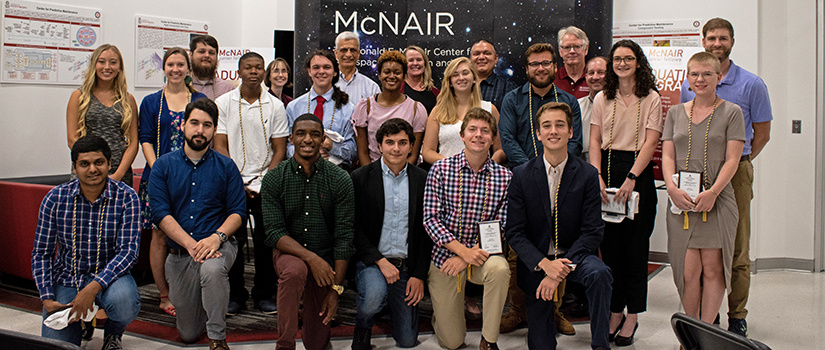By Rachel Myers | August 23, 2019
With more than 6,000 research hours under their belt, 22 University of South Carolina engineering students became McNAIR Junior Fellows (MJF) this summer. The group represents the top undergraduate students in the College of Engineering and Computing (CEC), nearly one-third of which are women.
During the intensive 12-week summer program, MJF participants were paired with CEC faculty members and challenged to solve real-world problems. They finished the program with a better understanding of the design process, research practices, and elements of working on an engineering team.
“We started this program five years ago, and now that it has attained maturity it’s living up to its mission of creating a unique environment where undergraduate students can learn and excel by engaging in cutting-edge research,” says Ramy Harik, associate professor of mechanical engineering and director of the program. “The MJF program is helping to shape future researchers and to equip them with skills needed for when they graduate.”
To be admitted to the program, students must be enrolled in the CEC and have at least 100 hours of previous research experience. They must also propose a specific project to be completed with a faculty mentor and answer questions about their research interests and career goals. Once accepted, the students commit up to 300 hours of work at the McNair Aerospace Engineering Center—with a minimum of five research hours per week.
The 2019 MJF students are the first to complete the program in its newly-expanded summer format. Earlier this year, CEC Dean Hossein Haj-Hariri committed up to $3,000 of support for each student engaged in the research experience. The newly-expanded program now allows students to work in all engineering and computing areas beyond aerospace engineering, such as biomedical engineering and computer science.
“For most of the faculty members, including myself, one of the most impactful elements of our education was getting involved in real research as undergraduates, and sharing the excitement that comes with creation of knowledge. For one moment in time, you know something that nobody else does,” Haj-Hariri says. “By committing funding to support a large cohort of students, and putting it under the brand of McNAIR, we thought that we could encourage more of our students to actively seek out research opportunities.”
At the end of the summer, the McNAIR Junior Fellows presented the culmination of their research at the summer research symposium. They completed the program at the MJF graduation ceremony where keynote speaker Lou Kennedy, CEO of Nephron Pharmaceuticals and UofSC graduate, reiterated the importance of the skills they gained in the program.
“I’d like for you to look up what we do at Nephron, because we are hiring, and you guys look like all great candidates,” Kennedy said, laughing. “If you can solve any of our problems, we need you and so does every other industry out there.”
Congratulations to the following 2019 McNAIR Junior Fellows:
Omari Adams
Mentor: Xinyu Huang, Mechanical Engineering
External Compression Testing
Andrew Anderson
Mentor: Ramy Harik, Mechanical Engineering
Thermoplastics AFP Exploration
Read about Andrew's research
Taylor Bauman
Mentor: Melissa Moss, Biomedical Engineering
Determining Methods to Alter Amyloid β-Protein Aggregation
Eboni Brown
Mentor: Erdem Sasmaz, Chemical Engineering
Specially Designed Nano-Structures for Low Temperature Reforming Applications
Brennan Cain
Mentor: Nikolaos Vitzilaios, Mechanical Engineering
UAV-USV collaboration
Andrew Campbell
Mentor: Michael Sutton, Mechanical Engineering
Preliminary Studies of Drone-based StereoDIC for inspection of Civilian Infrastructure
Elsa Compton
Mentor: Michael Sutton, Mechanical Engineering
Viscoelastic Properties of Thermoplastic Composite
Hunter Damron
Mentor: Ioannis Rekleitis, Computer Science and Engineering
Hierarchical State Estimation of an Underwater Robot
Ben Douglas
Mentor: Charles Pierce, Civil and Environmental Engineering
Evaluating Physical and Mechanical Properties of Gypsum Soils Stabilized with Asphalt
Emulsion
Lucas Dull
Mentor: Sang Hee Won, Mechanical Engineering
Characterization of NOx formation in the hydrocarbon post-flame zone
Natalie Duprez
Mentor: Kenneth Roberts, Chemical Engineering
Examining Photoactive and Thermoelectric Properties of Polymer-Metal Composites for
Potential Use in Harvesting of Energy
Lisa Falta
Mentor: Shamia Hoque, Civil and Environmental Engineering
Sustainable healthy building design
Brandon Fryson
Mentor: Enrica Viparellia, Civil and Environmental Engineering
Channel-Floodplain Interactions
Roberto Gambarini
Mentor: Chang Liu, Biomedical Engineering
Detection of diseased DNA fragments using nanoparticle attached CRISPR
Hayley Hall
Mentor: Michael Gower, Chemical Engineering & Biomedical Engineering
Assessing the ability of resveratrol releasing scaffolds to support healthy dietary
changes as a treatment strategy for type 2 diabetes
James Johnson
Mentor: Ioannis Rekleitis, Computer Science and Engineering
Autonomous 3D Coverage of Underwater Structures
Tristan Klintworth
Mentor: Pooyan Jamshidi, Computer Science and Engineering
Counterfactual Reasoning for Debugging Artificial Intelligence Systems
Carly Lawyer
Mentor: Erfan Goharian, Civil and Environmental Engineering
Vulnerability Assessment of Storm Water Management Ponds to Sea Level Rise in Coastal
Regions of South Carolina
Shilpkumar Patel
Mentor: Shamia Hoque, Civil and Environmental Engineering
Effects of Ventilation Design on Bacterial Transport
Andrew Re
Mentor: Nikolaos Vitzilaios, Mechanical Engineering
Small UAV Development
Read about Andrew's Research
Sydney Sanders
Mentor: Enrica Viparelli, Civil and Environmental Engineering
Effect of Sediment Patterns on Floodplains
John Weiss
Mentor: John Weidner, Chemical Engineering
Simulating the Performance of Porous Materials for Energy Applications
